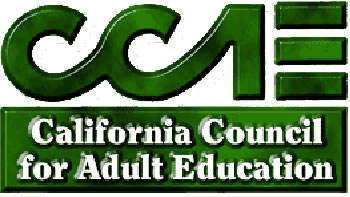Adult Education Update
Important Dates & Deadlines
11/30 Adjournment of the 2015-16 Legislative Session sine die
12/5 2017-2018 Session Begins 12/6 - 1/2 Legislative Winter Recess 1/10 Governor's 2017-2018 Budget Proposal Deadline Thankful & Looking Forward...by Dawn Koepke, CCAE Legislative Advocate
The last four years together have been an amazing journey with you all in the K12 adult education community. In this regard and during this week of thankfulness, I can't help but ponder the great strides we have made together to bring K12 based adult education back from the brink. While still much remains to be done, we are better situated than we have been in a long time and it is in no small way thanks to all of you for your unending hope, passion, support, trust and leg work at the local level. We would not be where we are today if it weren't for your passionate engagement for K12 based adult education overall and those students you serve. My thanks to you all...
As we look forward to another budget cycle, we've been extremely busy behind the scenes. While we certainly remain grateful for all we've been able to accomplish with the Administration, Department of Finance and Legislature, we know that we have more work to do to refine the Adult Education Block Grant and continue to strengthen K12 based adult education. In this regard, we've put together the attached 2017 Adult Education Framework and Executive Summary describing the current state of adult education, ongoing challenges, issues yet to be resolved, and solutions for resolving them in the next year. As you consider the solutions, you'll note they are not big, splashy changes. Instead, they seek to build on what we believe is a solid foundation in need of some additional refinements. At the core of these proposed refinements is our ongoing concern for access to K-12 based adult education. As you well know, K-12 adult schools' primary (and often only) funding comes from the AEBG. And while the AEBG provisions that provided funding to maintain capacity and access the last two years have been a good starting point, we are beginning to see erosion of that access as costs to run programs continue to increase and the number of adult students who need access to these programs also continues to increase. The capacity in place in K-12 adult schools needs to be protected and expanded to come even close to meeting the demand for services to help adults achieve literacy, basic skills, and secondary completion in order to successfully transition to higher education and/or careers with family-sustaining wages.
Unfortunately, however, with the beginning of a new economic downturn underway, projected to peak in 2018 (per DOF), we do not feel that it is achievable to obtain an additional, significant infusion of revenue into the AEBG - particularly with many consortia not having spent all they were allocated in the last fiscal year. That said, we have been clear that without some level of additional resources the capacity that we've fought so hard to maintain will continue to erode. In this regard, we are pushing strongly in the New Year for the establishment of a COLA for adult education. While we understand this will not address the needs in full, we do believe this is a reasonable and timely request. And based on feedback from DOF and the Legislature over the last year, we believe it may indeed be achievable this budget cycle. We would also note that establishment of a COLA this early in the AEBG process will help provide an added measure of stability in out years - something we all should consider very positive.
Other key issues we're planning to tackle in the next budget cycle include:
- Revision of "Grant" in "Adult Education Block Grant;"
- Encouragement of greater transparency in funding;
- SB 173 parameter recommendations for accountability, placement, other student outcomes, performance based funding, reciprocity, student identifiers, fees and more;
- Increased CDE responsibility for adult education in line with management of WIOA; and
- Creation of an AEBG Stakeholder Advisory Committee.
In addition to working on the Framework, we've been meeting with DOF and Legislative Budget and Policy Committee staff in preparation for the next Budget and Policy cycle that begins with the swearing-in of the 2017-2018 Legislature on December 5th. Our meetings have been very positive and fruitful, with our proposed refinements being viewed quite positively.
We are also pleased to report that last week we had the opportunity to meet with State Superintendent of Public Instruction (SPI) Tom Torlakson at the CDE. The SPI was joined by our own Adult Education office Director Chris Nelson; Career & College Transition Division Director Donna Wyatt; and Government Affairs Director Debra Brown and her colleague Alejandro Espinoza. The A-Team representing the field included CCAE President Sue Gilmore; CAEAA Past President and Hacienda La Puente Superintendent Cyndi Parulan-Colfer; CAEAA Leg Chair and CCAE Board Member Bob Harper; CTA Representative Wendy Dillingham; and yours truly, Dawn Koepke your CCAE and CAEAA Legislative and Budget Advocate. SPI Torlakson was very engaged and up to speed on the happenings with adult education. Nevertheless, we reminded him of the long road we've traveled over the last few years; the successes we've had to date; the challenges we continue to have; pushed him to take a stronger leadership role within the AEBG and with the Chancellor's office; and more. He was receptive to all we had to share and discuss. He also indicates that he is meeting with the Chancellor of the California Community Colleges and is prepared to help us in our push to address some of the key remaining challenges we've highlighted in our attached Framework. All very positive!
In terms of what we can expect from the 2017-2018 Legislature....much remains to be seen. While the activity at the federal level has many concerned for adult education and the students we serve, we are committed to continuing our fight to protect K12 based adult education and have no indication whatsoever that California under the new Legislature will do anything less than provide its full support.
Of note, Assembly Democrats were successful in gaining a super majority with three seats changing hands. Assemblyman David Hadley (R) lost to former Assemblyman Al Muratsuchi (D)(K12 adult education supporter), Assemblyman Eric Linder (R) lost to Sabrina Cervantez (D) and Assemblywoman Young Kim (R) lost to former Assemblywoman Sharon Quirk-Silva (D). Relative to inter-party fights, former Assemblyman Raul Bocanegra (D) regained his seat from ardent K12 adult education supporter Assemblywoman Patty Lopez (D); and moderate Assemblywoman Cheryl Brown (D) was unseated by the more progressive Eloise Reyes (D).
In the Senate, Democrats are also on the verge of a two-thirds supermajority with ballots in the Orange County Senate District 29 race between Assemblywoman Ling Ling Chang (R) and Democrat Josh Newman continuing to be counted and the race too close to call even two weeks after the General Election.
On the initiative front, California will see many policy shifts in the New Year as well as the continuation of the Proposition 30 tax on wealthy Californians through 2030 to help fund education via voter approval of Proposition 55. And as the dust continues to settle and the close races await confirmation of final vote counts, we now look to December 5th when the 2017-2018 Legislature will be sworn in to office. While some reports suggest a host of new moderate members will infuse the Assembly, the proof is in the pudding as we move into what is already shaping up to be a big year ahead on a number of policy fronts. A big unknown is how the two-thirds in the Assembly, and possibly the Senate, will play out - will moderates feel empowered to stand together or will members fall in line with leadership and more progressive ideals? Time will tell....and we're waiting with baited breath....
In the meantime and even after December 5th, we encourage you to get to know your local elected officials - especially new members. This is a great time of the year to visit them during their coffee hours and holiday open houses. To learn more about those types of events, we encourage you to visit their webpages after December 5th and sign up for their weekly or monthly district newsletters. These are a great way to learn more about what your legislators are doing for you and your community, to learn about district events, and more. And remember, as you meet with members in the district be sure to let CCAE and CAEAA know. Meetings and meet-and-greets do not need to be focused on a specific agenda and talking points at this point in the year, just get to know them and develop a rapport and ensure they know about your adult school and the benefit you provide to their community. That said, if you would like to or are asked about our agenda for the new session, feel free to share the attached Framework.
Once the Governor releases his 2017-2018 budget proposal, we'll be quickly evaluating the details, reporting out on them and developing talking points for the field in anticipation of Leg Day at the Capitol on April 4th. Be sure to mark your calendars and make arrangements to attend!
In the meantime, I wish you a happy, joyful and peaceful holiday season. I am thankful for you and look forward to another great year together! Cheers!
 |
